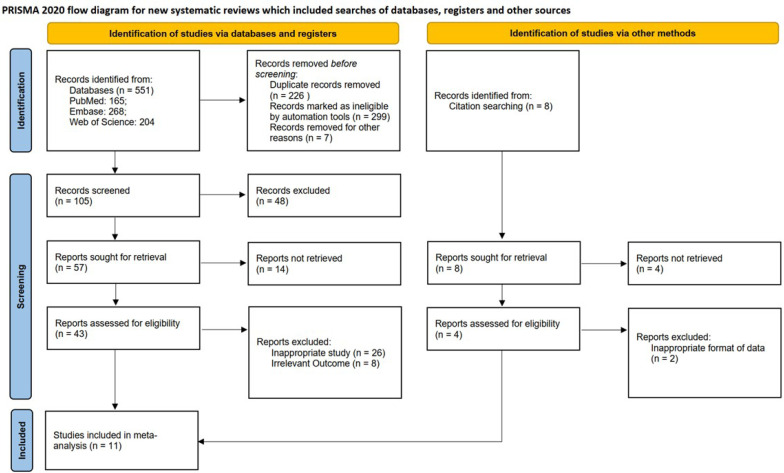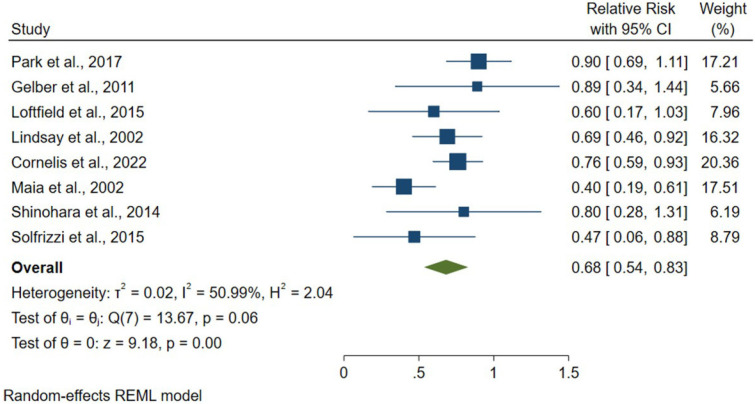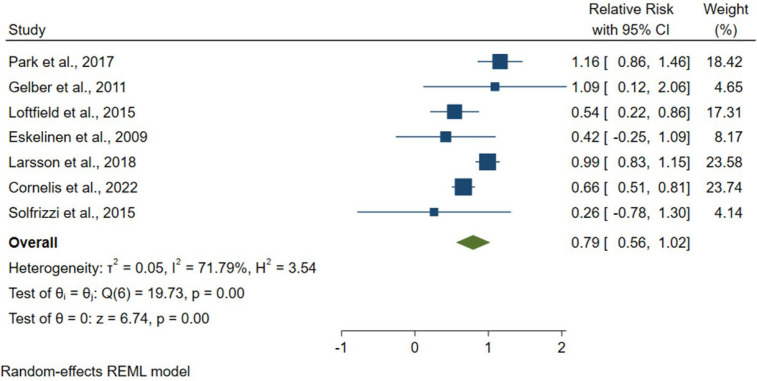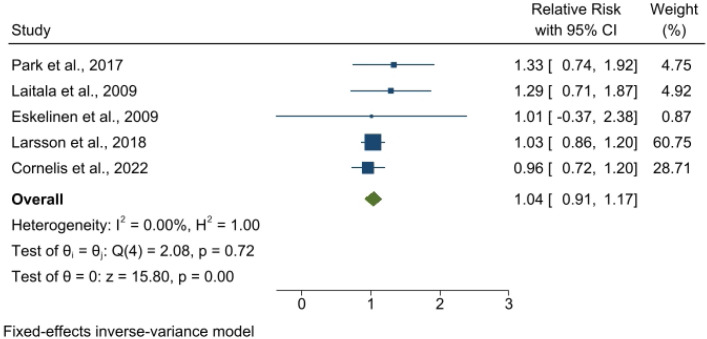Abstract
Alzheimer’s disease (AD) is a highly prevalent neurodegenerative disorder that affects millions of individuals globally. The identification of the lifestyle factors that potentially help prevent or postpone disease onset is of interest to the researchers. Although the study results are inconsistent, one such factor that has been extensively studied is coffee consumption. Therefore, this meta-analysis primarily aimed to investigate the effects of coffee consumption on the risk of AD. Pubmed, Embase, and Web of Science (Only Writing Web of Science is Fine) databases were searched for relevant studies with the keywords in various combinations, including “coffee”, “caffeine”, and “Alzheimer’s disease”. This meta-analysis included 11 studies. The relative risk (RR) with 95% confidence intervals (CI) was calculated to estimate the effect size. The study used the restricted maximum-likelihood method for a generic-inverse-variance analysis with random-effect (when heterogeneity, I2 > 50%) or fixed-effect (when heterogeneity, I2 < 50%) modeling. The study protocol has been registered at International Prospective Register of Systematic Reviews (CRD42023429016). Individuals that regularly consumed 1-2 cups and 2-4 cups coffee/day demonstrated a significantly lower risk of developing AD (1-2 cups/day: RR = 0.68, 95% CI = 0.54 to 0.83, I2 = 50.99%, p = 0.00 [the software used for analysis, shows the results of p value like this (0.00), I prefer not to change this as this is also fine]; 2-4 cups/day: RR = 0.79, 95% CI = 0.56 to 1.02, I2 = 71.79%, p = 0.00). However, individuals who consumed > 4 cups/day demonstrated an increased risk of developing AD (RR = 1.04, 95% CI = 0.91 to 1.17, I2 = 0.00%, p = 0.00). This meta-analysis indicates that limited (1-4 cups/day) daily coffee consumption reduces the risk of AD, whereas excessive consumption (> 4 cups/day) might increase the risk.
Keywords: Alzheimer disease, Caffeine, Coffee, Meta-analysis, Risk, Systematic review
INTRODUCTION
Alzheimer’s disease (AD), a prevalent neurodegenerative disorder, is estimated to be affected more than 24 million people worldwide [1,2]. It is characterized by the gradual deterioration of cognitive abilities, including memory, language, and perception [3]. While there is currently no cure for AD, there is an increasing emphasis on identifying lifestyle factors that may contribute to the prevention or delay of disease onset [4].
In recent years, coffee consumption has received significant attention as a lifestyle factor [5]. Coffee stands as one of the most extensively consumed beverages globally, and it is rich in a variety of bioactive compounds, including caffeine (1,3,7-trimethyl xanthine) and antioxidants [6]. These compounds have demonstrated neuroprotective properties and exhibit the potential in mitigating the risk of cognitive decline and dementia [7].
The caffeine content per cup of coffee varies significantly depending on multiple factors including serving size (ranging from 50-190 mL) or preparation method (such as filtered, boiled, instant) and type of coffee [4]. Espresso coffee has a caffeine content ranging from 0.6-3.3 mg/mL, while boiled or filtered coffee typically contains 0.7-1.1 mg/mL of caffeine. Instant coffee generally has a lower caffeine content of 0.2-0.6 mg/mL, although it can occasionally reach 1.0 mg/mL [8]. On average approximately 95 mg of caffeine can be found in an average cup of coffee [8].
Given the high prevalence of AD and the potential health benefits of coffee consumption, understanding the relationship between coffee and cognitive health is of great interest to researchers. Several studies have investigated the association between coffee intake and the risk of developing AD with mixed results. While some studies suggest that regular coffee consumption may be associated with a reduced risk of AD [9], others have found no association or harmful effect of coffee on AD [10]. Therefore, this study aims to explore the potential association between coffee consumption and the risk of developing AD, integrating the recent knowledge and providing guidance for future research directions.
MATERIALS AND METHODS
This systematic review was conducted conforming to the reporting guidelines outlined in Preferred Reporting Items for Systematic Reviews and Meta-Analyses [11]. Additionally, the ethical considerations in publishing systematic reviews were followed as outlined by Wager and Wiffen (2011) [12]. The study protocol was registered in the “International Prospective Register of Systematic Reviews” in 2023 (CRD42023429016).
1. Study selection
A comprehensive search strategy was employed to identify relevant studies examining the effect of coffee consumption on AD disease. Electronic databases, including PubMed, Embase, and Web of Science were systematically searched using relevant keywords: “coffee” OR “caffeine” AND “Alzheimer’s Disease”. Additionally, the reference lists of the identified articles and related review papers were manually searched. There was no restriction on language and year of publication. Citation retrieval was limited to human studies. The various combination of key terms for the search were included: A backward and forward reference checking for relevant studies were also performed.
2. Inclusion and exclusion criteria
Studies were considered if they encompassed the following parameters: (1) original research articles published in peer-reviewed journals; (2) investigated the association between coffee consumption and AD disease; (3) included human participants; (4) provided quantitative data on coffee consumption and its effect on AD; (5) had a clearly defined comparison group or control condition; (6) reported outcome measures related to AD (e.g., hazard ratio, risk ratio). Studies were excluded if they were: (1) review articles, letters, editorials, or conference abstracts; (2) animal studies or in vitro experiments; (3) duplicate publications or secondary analyses of the same dataset; (4) studies without a control group or comparison condition; (5) studies focusing solely on other neurodegenerative disorders or cognitive impairments unrelated to AD.
3. Data extraction
Two independent authors conducted the screening of titles and abstracts to identify potentially relevant studies. Full-text articles of potentially eligible studies were retrieved and assessed for final inclusion based on the predefined selection criteria. Disagreements between authors were resolved through discussion and consensus with the third author. Extracted information included first author, year of publication, number of populations in AD groups and healthy control groups, and outcome measures (e.g., hazard ratio, risk ratio, relative risk [RR]).
4. Data synthesis and statistical analysis
A meta-analysis was conducted to quantitatively synthesize the results of included studies. The effect sizes i.e. RR and corresponding 95% confidence intervals (CIs) were calculated for each study. Statistical heterogeneity among studies was assessed using the I2 statistic. If substantial heterogeneity (I2 > 50%) was present, a random-effects model and if small heterogeneity (I2 < 50%) was found, a fixed effect model was used for data synthesis. Generic inverse variance with random-effects meta-analysis using the restricted maximum likelihood method was performed by Stata 16 (Stata Corp.).
RESULTS
1. Study selection
As shown in Fig. 1, the systematic search yielded a total of 551 articles. After removing duplicates and using automation tools to remove ineligible articles, 105 articles remained. Titles and abstracts were screened, resulting in the exclusion of 48 articles that did not meet the inclusion criteria, leaving 57 studies. Among them, 14 studies were excluded due to inappropriate study design. Next, the full-text assessment was conducted on the remaining 43 articles, whereas 9 studies met the inclusion criteria. A further 8 studies were identified through manual citation searching using google scholar, of which 6 were excluded by primary and secondary screening, leaving 2 eligible studies. Finally, the meta-analysis considered a total of 11 studies for the analysis.
Fig. 1.
Flowchart (Preferred Reporting Items for Systematic Reviews and Meta-Analyses 2020) of study selection.
2. Characteristics of the eligible studies
Table 1 represents an overview of the characteristics of the 11 included studies. All included studies were published between 2002 and 2022, covering a substantial period of time. In total, these eligible studies involved a combined sample size of 6,121 individuals. The studies encompassed diverse geographical locations, including the United States, Hawaii, Canada, Italy, Portugal, Japan, Sweden, and Finland. Data pertaining to the patients were sourced from national registers, as well as clinical and neurological assessments (Table 1) [10,13-22].
Table 1.
Characteristics of the included studies
| Study | Year | Location | No. of population (cases) | Diagnosis method/record used for analysis |
|---|---|---|---|---|
| Park et al. [10] | 2017 | United States | 1,404 | National Death Register |
| Gelber et al. [15] | 2011 | Hawaii | 118 | Clinical and Neurological Tests |
| Loftfield et al. [16] | 2015 | United States | 93 | National Death Index |
| Lindsay et al. [17] | 2002 | Canada | 107 | Clinical and Neurological Tests |
| Cornelis et al. [14] | 2022 | United States | 888 | Clinical and Neurological Tests |
| Solfrizzi et al. [13] | 2015 | Italy | 1,445 | National Patient Register |
| Maia and de Mendonça [18] | 2002 | Portugal | 54 | Clinical and Neurological Tests |
| Noguchi-Shinohara et al. [19] | 2014 | Japan | 26 | Clinical and Neurological Tests |
| Larsson and Wolk [20] | 2018 | Sweden | 1,483 | National Patient Register |
| Laitala et al. [21] | 2009 | Finland | 445 | Clinical and Neurological Tests |
| Eskelinen et al. [22] | 2009 | Finland | 58 | Clinical and Neurological Tests |
3. Coffee consumption measures
Among the included studies, the measurement of coffee consumption varied. Most studies assessed coffee consumption through self-report questionnaires or dietary recall interviews. The type of coffee consumed also varied across studies, with some studies specifically examining the effects of caffeinated coffee, decaffeinated coffee, or both. The frequency and amount of coffee consumption were reported as cups per day consumed.
4. Meta-analysis
1) Regular coffee consumption of 1-2 cups/day
As shown in Fig. 2, the meta-analysis demonstrated a significant association between coffee consumption and a reduced risk of AD in the population who regularly consumed coffee of 1-2 cups/day. The effect size on the overall pooled RR for the association between coffee consumption and AD was 0.68 (95% CI [0.54 to 0.83]; I2 = 50.99%; p = 0.00) indicating a protective effect of coffee consumption against AD.
Fig. 2.
Forest plot showing the relative risk (RR) of regular 1-2 cups/day coffee consumption between patients with Alzheimer’s disease and healthy controls. Individual RR and their corresponding 95% confidence intervals (CI) are indicated by filled squares. The size of the square indicates the weight of the study in the random-effect meta-analysis. The summary estimate of RR and its 95% CI are indicated by a diamond.
REML: restricted maximum likelihood.
2) Regular coffee consumption of 2-4 cups/day
The population who consumed coffee of 2-4 cups daily also revealed a significantly lower risk of developing AD. As shown in Fig. 3, the pooled RR was 0.79 (95% CI [0.56 to 1.02], I2 = 71.79%, p = 0.00) which indicates a 21% reduced risk of developing AD.
Fig. 3.
Forest plot showing the relative risk (RR) of regular 2-4 cups/day coffee consumption between patients with Alzheimer’s disease and healthy controls. Individual RR and their corresponding 95% confidence intervals (CI) are indicated by filled squares. The size of the square indicates the weight of the study in the random-effect meta-analysis. The summary estimate of RR and its 95% CI are indicated by a diamond.
REML: restricted maximum likelihood.
3) Regular coffee consumption of > 4 cups/day
The meta-analysis demonstrated an elevated risk of developing AD among individuals consuming more than 4 cups of coffee per day. Fig. 4 presented the pooled RR as 1.04 (95% CI [0.91 to 1.17], I2 = 0.00%, p = 0.00) which indicates an increased risk of developing AD.
Fig. 4.
Forest plot showing the relative risk (RR) of regular more than 4 cups/day coffee consumption between patients with Alzheimer’s disease and healthy controls. Individual RR and their corresponding 95% confidence intervals (CI) are indicated by filled squares. The size of the square indicates the weight of the study in the random-effect meta-analysis. The summary estimate of RR and its 95% CI are indicated by a diamond.
DISCUSSION
The present meta-analysis aimed to investigate the association between coffee consumption and the risk of developing AD based on a statistical synthesis of available studies. The findings of this meta-analysis contribute to the existing literature by providing a comprehensive overview and quantification of the association between coffee consumption and AD risk.
Based on the findings, this meta-analysis suggests that lower doses of coffee consumption are associated with a decreased risk of developing AD. These findings are consistent with previous studies that have reported a similar inverse association between coffee consumption and AD risk [23,24]. A recent publication in the Journal of Alzheimer’s Disease (2021), examined a cohort of 1,445 participants aged 65 and above, derived from the Italian Longitudinal Study on Aging reported that individuals who consumed one to two cups of coffee per day exhibited 27% lower risk of developing AD compared to non-coffee drinkers [13]. Additionally, individuals who consumed more than two cups of coffee per day had a 30% reduced risk of developing AD [8].
However, not all studies have found a protective effect of coffee on cognitive health. A recent study published in 2023 found no association between coffee consumption and cognitive decline [25].
One possible mechanism underlying the protective effect of coffee consumption on AD may be the presence of bioactive compounds in coffee, such as caffeine and polyphenols. Caffeine, a central nervous system stimulant, has been shown to have neuroprotective properties, including the reduction of amyloid-beta production and tau phosphorylation, which are key pathological hallmarks of AD [26]. Polyphenols, on the other hand, possess antioxidant and anti-inflammatory properties, which may contribute to the prevention of neurodegeneration and cognitive decline [27].
It is worth mentioning that the meta-analysis also identified a potentially increased risk of AD among individuals consuming more than four cups of coffee per day. This finding is consistent with previous studies that suggested an association between coffee consumption and AD risk [28,29]. Excessive coffee consumption may harm the cardiovascular system or interact with other lifestyle factors contributing to AD risk. However, further research is needed to explore this association and determine the optimal level of coffee consumption for maximizing its potential protective effects on AD risk and to fully understand the relationship between coffee and cognitive health.
A few aspects of limitations of this meta-analysis should be considered. Firstly, the included studies were predominantly based on questionnaires, which may introduce inherent biases and confounding factors. Additionally, subgroup analysis of the included studies was not performed due to the unavailability of adequate data.
In conclusion, this meta-analysis provides evidence supporting a protective effect of coffee consumption against AD with limited consumption of coffee. However, it also suggests that excessive consumption of coffee may be associated with an increased risk of AD, highlighting the need for moderation in coffee intake. Future prospective studies and randomized controlled trials are warranted to further elucidate the underlying mechanisms and determine optimal coffee consumption patterns for reducing AD risk.
• Acknowledgements
The authors would like to acknowledge the invaluable support and critical comments of members of ‘Biological Clock & Aging Control’ laboratory.
NOTES
• Authors’ contributions
I.S.N. and Y.H. participated in conceptualization of the study. I.S.N. participated in curated the data, conducting the formal analysis, investigation, and project administration. Y.H., I.S.N., and V.M.V.M. participated in funding acquisition. I.S.N., V.M.V.M., and Z.A.K. participated in drafting methodology and visualization. Y.H. provided resource and articipated in supervision, validation. I.S.N. and V.M.V.M., provided software. Y.H. and I.S.N. wrote the original draft of the manuscript. All authors reviewed and edited the manuscript.
• Conflicts of Interest
No conflict of interest.
• Funding
This work was supported in part by a grant from the National Research Foundation (2020R1A2C2012155 to Y.H.), Korea. ISN and VMVM were supported by Global Korea Scholarship (GKS-CS01190170 to ISN, GKS-CS01211079 to VMVM), Korea.
REFERENCES
- 1.Cai H, Cong WN, Ji S, Rothman S, Maudsley S, Martin B. Metabolic dysfunction in Alzheimer's disease and related neurodegenerative disorders. Curr Alzheimer Res. 2012;9(1):5–17. doi: 10.2174/156720512799015064. [DOI] [PMC free article] [PubMed] [Google Scholar]
- 2.Kumar A, Sidhu J, Goyal A, Tsao JW. Alzheimer disease. In: StatPearls [Internet] Treasure Island (FL): StatPearls Publishing; 2023. NBK499922. [Google Scholar]
- 3.Solomon A, Mangialasche F, Richard E, Andrieu S, Bennett DA, Breteler M, et al. Advances in the prevention of Alzheimer's disease and dementia. J Intern Med. 2014;275(3):229–50. doi: 10.1111/joim.12178. [DOI] [PMC free article] [PubMed] [Google Scholar]
- 4.Rasch V. Cigarette, alcohol, and caffeine consumption: Risk factors for spontaneous abortion. Acta Obstet Gynecol Scand. 2003;82(2):182–8. doi: 10.1034/j.1600-0412.2003.00078.x. [DOI] [PubMed] [Google Scholar]
- 5.Bonita JS, Mandarano M, Shuta D, Vinson J. Coffee and cardiovascular disease: In vitro, cellular, animal, and human studies. Pharmacol Res. 2007;55(3):187–98. doi: 10.1016/j.phrs.2007.01.006. [DOI] [PubMed] [Google Scholar]
- 6.Ritchie K, Carrière I, de Mendonca A, Portet F, Dartigues JF, Rouaud O, et al. The neuroprotective effects of caffeine: A prospective population study (the Three City Study) Neurology. 2007;69(6):536–45. doi: 10.1212/01.wnl.0000266670.35219.0c. [DOI] [PubMed] [Google Scholar]
- 7.Eskelinen MH, Kivipelto M. Caffeine as a protective factor in dementia and Alzheimer's disease. J Alzheimers Dis. 2010;20 Suppl 1:S167–74. doi: 10.3233/JAD-2010-1404. [DOI] [PubMed] [Google Scholar]
- 8.Bjarnadottir A. How much caffeine in a cup of coffee? A detailed guide [Internet] Healthline Media; 2023. [cited 2023 May 25]. Available from: https://www.healthline.com/nutrition/how-much-caffeine-in-coffee . [Google Scholar]
- 9.Santos C, Lunet N, Azevedo A, de Mendonça A, Ritchie K, Barros H. Caffeine intake is associated with a lower risk of cognitive decline: A cohort study from Portugal. J Alzheimers Dis. 2010;20 Suppl 1:S175–85. doi: 10.3233/JAD-2010-091303. [DOI] [PubMed] [Google Scholar]
- 10.Park SY, Freedman ND, Haiman CA, Le Marchand L, Wilkens LR, Setiawan VW. Association of coffee consumption with total and cause-specific mortality among nonwhite populations. Ann Intern Med. 2017;167(4):228–35. doi: 10.7326/M16-2472. [DOI] [PMC free article] [PubMed] [Google Scholar]
- 11.Page MJ, Moher D. Evaluations of the uptake and impact of the Preferred Reporting Items for Systematic reviews and Meta-Analyses (PRISMA) Statement and extensions: A scoping review. Syst Rev. 2017;6(1):263. doi: 10.1186/s13643-017-0663-8. [DOI] [PMC free article] [PubMed] [Google Scholar]
- 12.Wager E, Wiffen PJ. Ethical issues in preparing and publishing systematic reviews. J Evid Based Med. 2011;4(2):130–4. doi: 10.1111/j.1756-5391.2011.01122.x. [DOI] [PubMed] [Google Scholar]
- 13.Solfrizzi V, Panza F, Imbimbo BP, D'Introno A, Galluzzo L, Gandin C, et al. Coffee consumption habits and the risk of mild cognitive impairment: The Italian longitudinal study on aging. J Alzheimers Dis. 2015;47(4):889–99. doi: 10.3233/JAD-150333. [DOI] [PubMed] [Google Scholar]
- 14.Cornelis MC, Bennett DA, Weintraub S, Schneider JA, Morris MC. Caffeine consumption and dementia: Are Lewy bodies the link? Ann Neurol. 2022;91(6):834–46. doi: 10.1002/ana.26349. [DOI] [PMC free article] [PubMed] [Google Scholar]
- 15.Gelber RP, Petrovitch H, Masaki KH, Ross GW, White LR. Coffee intake in midlife and risk of dementia and its neuropathologic correlates. J Alzheimers Dis. 2011;23(4):607–15. doi: 10.3233/JAD-2010-101428. Erratum in: J Alzheimers Dis 2013;36(4):809. [DOI] [PMC free article] [PubMed] [Google Scholar]
- 16.Loftfield E, Freedman ND, Graubard BI, Guertin KA, Black A, Huang WY, et al. Association of coffee consumption with overall and cause-specific mortality in a large US prospective cohort study. Am J Epidemiol. 2015;182(12):1010–22. doi: 10.1093/aje/kwv146. [DOI] [PMC free article] [PubMed] [Google Scholar]
- 17.Lindsay J, Laurin D, Verreault R, Hébert R, Helliwell B, Hill GB, et al. Risk factors for Alzheimer's disease: A prospective analysis from the Canadian Study of Health and Aging. Am J Epidemiol. 2002;156(5):445–53. doi: 10.1093/aje/kwf074. [DOI] [PubMed] [Google Scholar]
- 18.Maia L, de Mendonça A. Does caffeine intake protect from Alzheimer's disease? Eur J Neurol. 2002;9(4):377–82. doi: 10.1046/j.1468-1331.2002.00421.x. [DOI] [PubMed] [Google Scholar]
- 19.Noguchi-Shinohara M, Yuki S, Dohmoto C, Ikeda Y, Samuraki M, Iwasa K, et al. Consumption of green tea, but not black tea or coffee, is associated with reduced risk of cognitive decline. PLoS One. 2014;9(5):e96013. doi: 10.1371/journal.pone.0096013. [DOI] [PMC free article] [PubMed] [Google Scholar]
- 20.Larsson SC, Wolk A. The role of lifestyle factors and sleep duration for late-onset dementia: A cohort study. J Alzheimers Dis. 2018;66(2):579–86. doi: 10.3233/JAD-180529. [DOI] [PMC free article] [PubMed] [Google Scholar]
- 21.Laitala VS, Kaprio J, Koskenvuo M, Räihä I, Rinne JO, Silventoinen K. Coffee drinking in middle age is not associated with cognitive performance in old age. Am J Clin Nutr. 2009;90(3):640–6. doi: 10.3945/ajcn.2009.27660. [DOI] [PubMed] [Google Scholar]
- 22.Eskelinen MH, Ngandu T, Tuomilehto J, Soininen H, Kivipelto M. Midlife coffee and tea drinking and the risk of late-life dementia: A population-based CAIDE study. J Alzheimers Dis. 2009;16(1):85–91. doi: 10.3233/JAD-2009-0920. [DOI] [PubMed] [Google Scholar]
- 23.Chen JQA, Scheltens P, Groot C, Ossenkoppele R. Associations between caffeine consumption, cognitive decline, and dementia: A systematic review. J Alzheimers Dis. 2020;78(4):1519–46. doi: 10.3233/JAD-201069. [DOI] [PMC free article] [PubMed] [Google Scholar]
- 24.Liu QP, Wu YF, Cheng HY, Xia T, Ding H, Wang H, et al. Habitual coffee consumption and risk of cognitive decline/dementia: A systematic review and meta-analysis of prospective cohort studies. Nutrition. 2016;32(6):628–36. doi: 10.1016/j.nut.2015.11.015. [DOI] [PubMed] [Google Scholar]
- 25.Abbel D, Åsvold BO, Kolberg M, Selbæk G, Noordam R, Skjellegrind HK. The association between coffee and tea consumption at midlife and risk of dementia later in life: The HUNT Study. Nutrients. 2023;15(11):2469. doi: 10.3390/nu15112469. [DOI] [PMC free article] [PubMed] [Google Scholar]
- 26.Cao C, Loewenstein DA, Lin X, Zhang C, Wang L, Duara R, et al. High Blood caffeine levels in MCI linked to lack of progression to dementia. J Alzheimers Dis. 2012;30(3):559–72. doi: 10.3233/JAD-2012-111781. [DOI] [PMC free article] [PubMed] [Google Scholar]
- 27.Tores de la Cruz S, Iriondo-DeHond A, Herrera T, Lopez-Tofiño Y, Galvez-Robleño C, Prodanov M, et al. An assessment of the bioactivity of coffee silverskin melanoidins. Foods. 2019;8(2):68. doi: 10.3390/foods8020068. [DOI] [PMC free article] [PubMed] [Google Scholar]
- 28.Vercambre MN, Berr C, Ritchie K, Kang JH. Caffeine and cognitive decline in elderly women at high vascular risk. J Alzheimers Dis. 2013;35(2):413–21. doi: 10.3233/JAD-122371. [DOI] [PMC free article] [PubMed] [Google Scholar]
- 29.Santos C, Costa J, Santos J, Vaz-Carneiro A, Lunet N. Caffeine intake and dementia: Systematic review and meta-analysis. J Alzheimers Dis. 2010;20 Suppl 1:S187–204. doi: 10.3233/JAD-2010-091387. [DOI] [PubMed] [Google Scholar]






